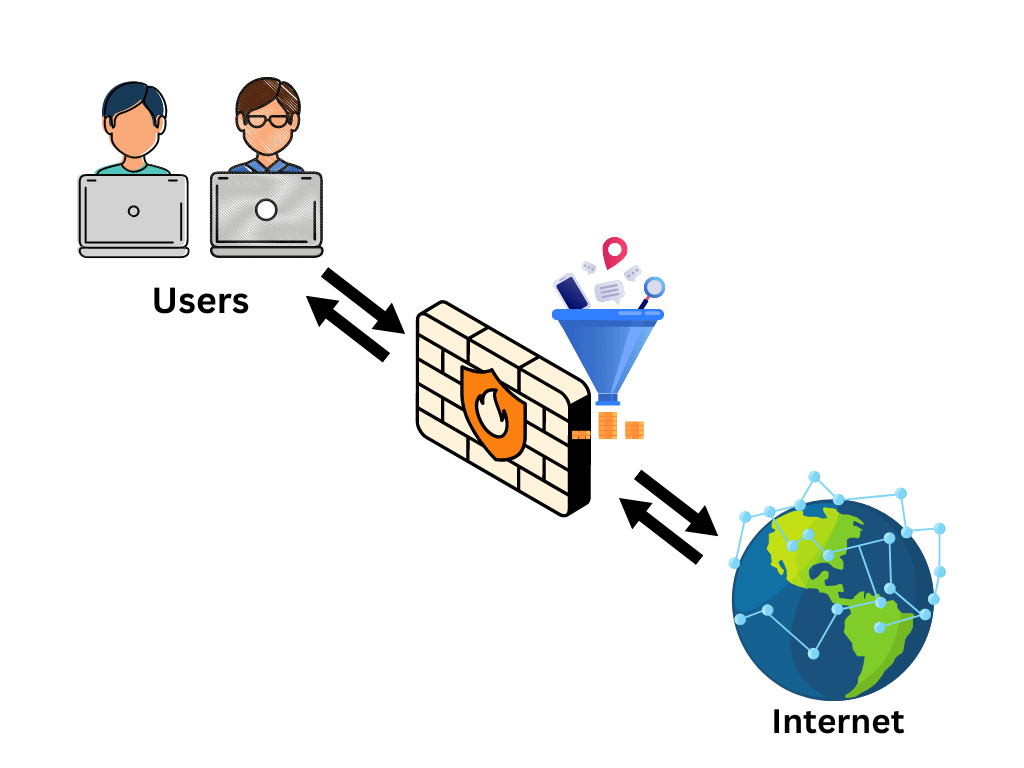Understanding Firewalls: Your First Line of Defense in Cybersecurity

In an era dominated by technology, where threats lurk around every digital corner, safeguarding our digital assets has become paramount. One vital element of this defense is a firewall. But what exactly is a firewall? In simple terms, a firewall acts as a protective barrier between your computer network and the vast and potentially dangerous expanse of the internet. Its purpose is to monitor and control incoming and outgoing network traffic, allowing only authorized data packets to pass while blocking malicious ones.
The Function of a Firewall
At its core, a firewall acts as a gatekeeper, analyzing the data packets that flow in and out of a network. It examines various aspects of these packets, such as their source, destination, and content, to determine their legitimacy. By enforcing predefined security rules, a firewall can filter out potentially harmful traffic, such as viruses, malware, and unauthorized access attempts.
Why does an organisation need a firewall?

Protecting Sensitive Data:
Organizations deal with vast amounts of sensitive data, including customer information, intellectual property, and financial records. A firewall acts as a shield, safeguarding this valuable data from unauthorized access, malicious intrusions, and data breaches. It monitors network traffic and blocks suspicious or malicious activities, ensuring that only authorized entities can access the organization's resources.

Preventing cyber threats:
Hackers, viruses, and malware constantly try to find vulnerabilities in an organization's network. A firewall actively monitors and filters incoming data, identifying potential threats and blocking them before they can cause harm. It's like having a virtual shield that safeguards sensitive information and prevents unauthorized access.

Maintaining business continuity:
A firewall helps prevent network downtime and disruptions caused by cyberattacks. By filtering out malicious traffic, it ensures that critical systems and services remain operational, reducing the risk of costly downtime and enabling businesses to function smoothly.

Content Filtering and Access Control:
Firewalls offer additional features, such as content filtering and access control. Content filtering allows organizations to block access to certain websites or types of content, ensuring that employees adhere to company policies and preventing the introduction of malicious software.
In conclusion, a firewall is a crucial component of any organization’s cybersecurity infrastructure. By acting as a digital barrier, it protects the network from unauthorized access, external threats, and potential data breaches. It safeguards personal privacy, filters content, and provides access control, ensuring that the organization’s systems and data remain secure. With the ever-evolving landscape of cyber threats, investing in a robust firewall solution is an essential step towards safeguarding the organization’s digital assets and maintaining the trust of customers and stakeholders.
How much to do you need to spend on a firewall?
The cost of hardware for a firewall in a small business can range from $700 to $1,000. For businesses with 15 to 100 users, the price for firewall hardware typically falls between $1,500 and $4,000. Several factors contribute to the overall price of a hardware firewall, including:
- Make, Model, and Characteristics: The specific make, model, and features of the firewall impact its cost. Factors like performance, capacity, and redundancy play a role in determining the price.
- Ongoing Security Subscriptions: Additional expenses may include the cost of security subscriptions or services that provide continuous protection and updates to the firewall.
- Configuration, Monitoring, and Maintenance: The cost of setting up and configuring the firewall, ongoing monitoring, integration into the existing network, and regular maintenance also contribute to the overall expenses.
When selecting a network firewall, it is important to conduct a thorough assessment of your business needs. This assessment should consider factors such as the size of your business and the level of security required.
Exploring Next-Generation Firewalls

In the rapidly evolving landscape of cybersecurity, traditional firewalls are no longer sufficient to protect organizations from modern threats. That’s where next-generation firewalls (NGFWs) come into play. In simple terms, NGFWs are advanced security solutions that provide enhanced protection and more robust features than traditional firewalls.
So, what makes NGFWs different and why should you consider them? Let’s delve into the basics:
- Deep Packet Inspection: NGFWs go beyond simple traffic filtering. They employ deep packet inspection, a powerful technique that examines network traffic at a granular level. This means they can analyze the content of data packets, not just the source and destination, enabling them to detect and block more sophisticated threats.
- Application Awareness: Unlike traditional firewalls that primarily focus on ports and protocols, NGFWs have a deep understanding of applications. They can identify specific applications, such as web browsers or email clients, and enforce fine-grained security policies. This allows organizations to have better control over how applications are used within their network.
- Intrusion Prevention: NGFWs often incorporate intrusion prevention systems (IPS) that actively monitor network traffic for signs of known attack patterns or suspicious behavior. They can detect and block intrusions in real-time, preventing potential breaches before they can cause damage.
- Advanced Threat Protection: NGFWs often integrate additional security features, such as antivirus, anti-malware, and sandboxing capabilities. These advanced threat protection mechanisms help identify and mitigate emerging threats, including zero-day attacks and sophisticated malware.
- Centralized Management and Visibility: NGFWs offer centralized management consoles that provide administrators with a comprehensive view of network activity and security events. This simplifies security management, allowing organizations to efficiently monitor and control their network security posture.
- Scalability and Flexibility: NGFWs are designed to accommodate the evolving needs of modern networks. They can scale to support growing network infrastructure and can be tailored to specific requirements, such as integrating with cloud services or remote access VPNs.


